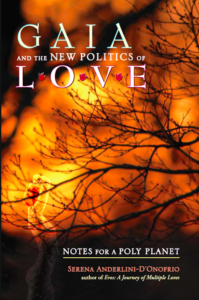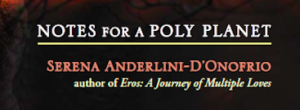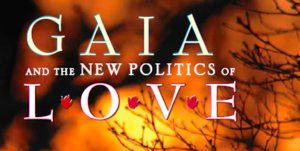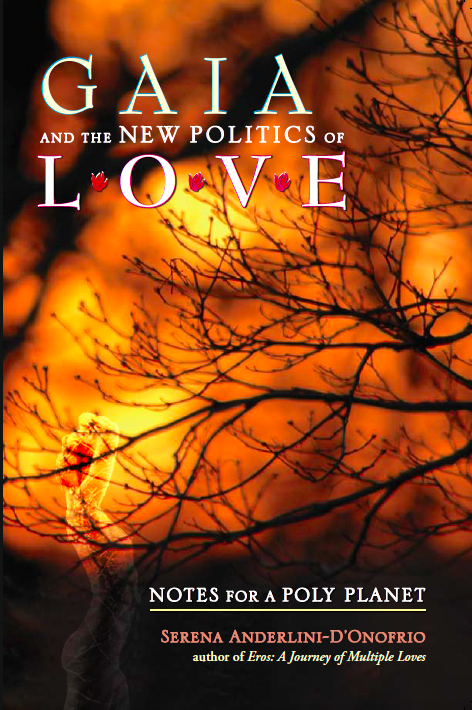Praise for
Gaia and the New Politics of Love:
Notes for a Poly Planet
Serena Anderlini-D’Onofrio
Heed Serena’s invitation, it potentially changes our lives: purges our fears, exorcises our guilt, banishes our embarrassment and enhances our health. Most surprisingly, her thesis excites our intellect.
True love reciprocates, resists exclusivity, abhors domination and subjugation.
Yes, true love celebrates childish affection and timely genital friction without abrogation of responsibility. Decidedly, like music, mathematics or other geologically recent and supremely human endeavors, love does NOT come naturally. If it did there would be no need for Serena’s book.

Love, never for sale, must be “glady learned” and “carefully taught.” Whether with lover, friend, planetmate or even enemy, love is a peculiar conversation that requires the subtleties of education: rhythmic nurture and thoughtful deliberation.
Serena makes clear that love is not sex, nor marriage, nor social obligation although often these are muddled.
Serena, the polyglot creator and bibliophilic literata, outlines her view of the feasible from which we may construct marching orders: a simultaneous path to personal joy and planetary recovery, to stimulation and response that transcends any foolish commitment to selfishly increase the human population.
In her clear loud voice, sometimes fierce and always open, honest and intelligent, she quantitatively demonstrates that no law of the conservation of love exists.
The more we love the safer we are and the more we love the more love we receive.
You may be prompted, in an intolerant tizzy or jealous fury to call her crazy.
You may instinctively reject as hopelessly naive her poly-love practices and admonitions to be yourself.
Read GAIA and the NEW POLITICS of LOVE for what it is: an original idea, a serious, scholarly antidote to the lovelessness that makes us miserable on this liveliest of planets, a sunlit place that, in no way, do we own.
Lynn Margulis, author of Symbiotic Planet: A New Look at Evolution and Mystery Dance: On the Evolution of Human Sexuality, Distinguished University Professor, University of Massachusetts-Amherst, Eastman Professor 2008-2009 Balliol College, Oxford University
Gaia and the New Politics of Love: Notes for a Poly Planet is a groundbreaking work that addresses cultural structures, artifacts, and their intersections with social and institutional spaces, offering a distinctive perspective on the interactions between media, sexuality, culture, and international relations.

Its unique blend of ecologically grounded insight and intellectually rigorous analysis offers a singularly exquisite vision of the potentials for humans to interact with each other and our environments.
Searching for utopia but finding fallibility, Anderlini-D’Onofrio provides a vision of how we as a culture, people, and species could interact if we rise to the challenge of integral living in the 21st century. Her complex and interdisciplinary approach enables new discourses regarding love and forms of amorous expression that transcend presumptions of monogamy and the narrow homo/hetero divide.
Anderlini-D’Onofrio’s elegant fusion of history, theory, and culture allows her to reach academic and popular audiences, presenting the complexities of Deleuzian and Queer theories with a lyrical prose, and offering a unique opportunity for academicians and the lay public to consider complex ideas presented in an accessible way.
In so doing, she brings new vigor to a type of public intellectualism that cultivates accessibility in education, not as “instruction” about a knowledge already formed, but rather as participation in a laboratory where discourse allows participants to co-elaborate new knowledges.
Gaia and the New Politics of Love demonstrates Anderlini-D’Onofrio’s innovation and courage in crossing disciplinary boundaries, and in transcending the ordinary, conventional, and safe. Anderlini-D’Onofrio’s work allows us all to conceive of a world in which people are willing to take risks for the sake of a vision that they think is beautiful and necessary, of being willing to make powerful enemies when something as important as human and planetary life is at stake.
Elisabeth Sheff, PhD, Sociologist and Expert in the Study of Polyamory, Georgia State University, Atlanta
This book is a ‘must read’ for all who want the human species to not only survive, but flourish in harmony with the earth. The thesis of this book is that we must learn to live cooperatively with each other and the living planet, Gaia, if we want any chance of survival as a species.
Dr. Anderlini-D’Onofrio makes a strong case that if we want to learn how to survive, we would do well to look to the nascent bisexual and polyamorous movements as specific groups of folks who are already exploring and developing the interpersonal and communications skills necessary to make this transition successfully.
Her first hand experiences within these communities are the most accurate description of these movements I have seen and match my own personal experiences. If you want to read one book this year that will completely reorient your perspective on how we are going to save ourselves and Gaia, interpersonally, environmentally and politically (what Anderlini-D’Onofrio calls “ecofeminism”), this book will do the trick.
C.T. Butler, author of On Conflict and Consensus, Food Not Bombs Publishing, 1991
Gaia and the New Politics of Love is a much needed intervention in contemporary discussions about the future of our planet–a discussion that is multi-faceted, complex, inter-disciplinary, and pressing.

Anderlini-D’Onofrio’s success lies in her awareness of the complexity of that discussion, including its deeply inter-disciplinary nature, as well as her passionate commitment to productive change.
She helps us envision a world that is more compassionate, more euquitable–indeed, more loving–and she beautifully brings her tremendous scholarly acumen and critical intelligence to bear on this project.
We need more such examples of comp/passionate scholarship. And that Anderlini-D’Onofrio convinces us to think about polyamory as a possible solution to so many vexing problems–from ecology to civil rights–is further testament to both her daring and her rhetorical power.
Jonathan Alexander, PhD, Professor of English, University of California, Irvine, General Editor, The Journal of Bisexuality
Serena has a gift for connecting the general and the particular, so as to make even global concepts like Eco-Feminism link tightly with our mundane lives. And this is essential to the successful dissemination of her important theme.
That the way each of us loves and partners with each other affects the breath and blood of the very earth on which we live is something everyone needs to understand better, especially in this difficult time of hatred and war.
And Serena possesses the perfect feminine voice from which to learn this lesson.
Terisa Greenan, creator of Family, the polyamory web series, www.3dogpictures.com
With this profound, yet easy-to-read book, Serena Anderlini-D’Onofrio shows strong interconnections among areas of public debate that appear to be quite unrelated. Polyamory, she argues, is not only good for those who practice it, but even for the entire planet!
In fact, she argues, love, sex, the environment, nature conservancy, health, peace, feminism, human rights, and happiness, are all intertwined with each other. If our political leaders had better sex, we would probably have fewer wars!
Other important points in her argument include: the idea that God was created by humans in their image, and not vice versa; and the suspicion that those of the “virus party” might have had a personal interest in spreading the idea that the syndrome known as AIDS is exclusively contagious.
She addresses all these delicate issues with clarity, strength and courage. I hope that as many people as possible read this book, so that its ideas, which are essential to save our planet, may spread as widely as possible.
Carlo Consiglio, Professor of Zoology, University of Rome “La Sapienza.” Author of L’amore con più partner (love with more partners), Pioda, Rome, second edition 2009.
In this fascinating book about the ecology of love for a sustainable planet, the author does exactly what she sets out to do, makes the case that “a world where it is safe to love is a world where it is safe to live.”
Freedom of erotic expression, as an integral part of sexual freedom, is as a fundamental human right and the core of Anderlini-D’Onofrio’s new politics of love. Don’t miss this superb read.
Ricci Joy Levy, Executive Director, Woodhull Freedom Foundation
Introduction
Ecologies of a Playful Earth
 Some say an army of horsemen, or infantry, a fleet of ships is the fairest thing on the face of the black earth, but I say it’s what one loves. This is very easily understandable . . . for each of us. She who far surpassed the beauty of all, Helen, just went and left her noble husband, sailing she went far away to Troy
Some say an army of horsemen, or infantry, a fleet of ships is the fairest thing on the face of the black earth, but I say it’s what one loves. This is very easily understandable . . . for each of us. She who far surpassed the beauty of all, Helen, just went and left her noble husband, sailing she went far away to Troy
Sappho of Lesbos, 7th Century BCE
Our mission is to affect planetary consciousness, nurture spiritual and ecological disciplines, disseminate ancient wisdom, and put forth ways to transmute cultural dissonance and violence into service
North Atlantic Books, Berkeley, California
Some individuals can be exposed to HIV and yet do not become infected . . . some . . . become infected but do not progress toward immunodeficiency. . . . It is possible that the mechanisms . . . are the same. . . . The objective is to make [the] immune system fully competent.
Luc Montagnier, Nobel Laureate in Medicine, October 21, 2008
I have no utterance left, my tongue is broken down, and straightway a subtle fire has run under my skin, with my eyes I have no sight, my ears ring, sweat pours down, and a trembling seizes all my body
Sappho of Lesbos, 7th Century BCE


